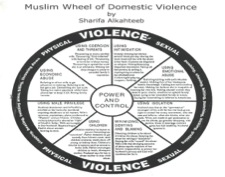Unhealthy Abusive Relationships
By Malahat Baig-Amin, LCSW, Psychotherapist
(Our counselor, Malahat Baig-Amin, wrote this article especially for our users like you! Read her bio here.)
Domestic violence occurs in almost all communities around the world regardless of culture, religion, education or economic background. Muslim communities are not exempt from this phenomenon and must face the challenge of understanding, identifying and addressing it appropriately. It’s not an easy subject to discuss because it gets veiled into a private family matter to protect honor, minimize shame and blame.
Domestic violence is defined as a pattern of coercive (forced) behavior used by one person in an intimate relationship to gain or maintain power and control over another person. The majority of domestic violence occurs against women by men but men can also be victims of abuse. Stress, unemployment, drug/alcohol abuse or mental illness do not cause domestic violence however, they can contribute to or heighten the potential for abus.
When people think about domestic violence, they are often referring to physical abuse but, there are several types of abuse and many ways in which an individual may experience domestic violence including emotional/psychological, verbal, sexual and financial abuse. Research suggests that the effects of psychological abuse can be even more damaging than the effects of physical abuse.
Islam and Domestic Violence
Islam does not condone violence in any form including domestic violence; rather, Islam condemns it and places responsibility on the community when members do not act in accordance with Islamic values for justice and equity within the family and larger context of community.
“…stand up firmly for justice as witnesses to God, even if it is against yourselves, or your parents, or your relatives…” (Qur’an 4:135).
“…fight in the cause of God and for those who, being weak, are ill-treated and oppressed…” (Qur-an, 4:75).
All Muslims must, “…fight against the one that oppresses another until the person complies with the command of God”(Qur’an, 49:9).
One of the earliest examination’s of domestic violence among Muslim families in the US was done by Dr. Sharifa Alkhateeb. This is an excerpt from Ending Domestic Violence in Muslim Families:
“Under no circumstances is violence against women encouraged
or allowed. The holy Qur’an contains teens of verses extolling
good treatment of women. Several specifically enjoin kindess
to women (2:229-237; 4:19; 4:25). These verses make it clear
that the relationship between men and women is to be one
of kindness, mutual respect, and caring. Some verses, where
Allah calls men and women “protecting friends of one
another,” refer to the mandated atmosphere of mutual
kindness and mercy in the marital home (30:21; 9:71). Others
show disapproval of oppression or ill treatment of women. “
The Muslim Wheel of Domestic Violence (adapted from the Power and Control Wheel developed by the Domestic Abuse Project of Duluth, Minnesota) also developed by Dr. Sharifa Alkhateeb illustrates the how various forms of power and control can be played out in the Muslim context.
Understanding Trauma
Some believe that there may be an intergenerational cycle of abuse (Pollak, 2003) that predisposes children who grew up in abusive households as more likely to either become victims of domestic violence or the abusers in relationships (Whitefield, 2003). Children witnessing and/or having exposure to abuse in the household have traumatic effects that can affect them developmentally, physiologically and psychologically. This can affect the formation of healthy relationships for individuals coming out of these childhood experiences. In addition, some victims are at risk for depression and PTSD because of the trauma they have experienced. So, the unresolved trauma combined with the present abuse creates a complicated situation that is not easily understood without some guidance and assistance from helping professionals.
Cultural factors can play an important role. Culture and traditions can provide strength for families and individuals but also can be obstacles to seeking help. Muslims communities are diverse but some may place more value on the collective rather than on the individual sense of self which can impact decision making for a victim.
Understanding Interventions
There are numerous approaches to addressing domestic violence and varying theories. The primary concept of ensuring and protecting safety is widely accepted by most experts as a vital first measure. Although one may think that couples counseling can be helpful, most experts in the field would suggest that this form of intervention can be highly dangerous and not recommended as an initial form of treatment or best practice. Engaging couples when there is domestic violence can actually escalate the problem especially in cases where there is physical abuse. So, although there may be a hope to bring the couple together to work on the relationship issues, the first course of treatment may involve an alternative approach to couples therapy.
Domestic Violence Programs & Counseling:
Thankfully, there many reputable and well-established domestic violence programs in most US cities or counties. Domestic violence workers/counselors are trained to deal with the very distinct issues that many victims face. It’s important to reach out to these groups because they can provide a victim with options for help.
Separate individual counseling with a therapist specializing in domestic violence and trauma may be an option worth considering after ensuring safety. Domestic violence therapists may be able to assist an individual to uncover the personal and individual issues that are at the base of the problem, which may prevent the individual from knowing how to get his/her needs met within the relationship. As discussed, there may be a history of abuse in their childhood that needs to be accessed and understood. Abuse is a learned behavior and it takes time to understand how past issues impact us, learn new ways of coping and acquire skills to communicate differently and manage some of the overwhelming feelings that come up such as anger. As trauma usually plays a role in the equation, it’s imperative to be able to work through any prior trauma in order to effectively manage the relationship dynamics.
The question is who holds the power and uses it in this relationship to control the other? There may be times when one partner defends her/himself and some family or others may interpret this as mutual abuse. Working individually with a therapist will be benefit each partner.
Therapists do not report abuse of adults unless there is abuse of an elderly person or a threat to self or others. So, it’s unlikely that the therapist would report domestic violence. However, anyone can call the police (for instance, concerned neighbors may hear couples fighting) and in many states, if there is enough evidence, police may be required to take action in domestic violence.
Protective & Legal Interventions
It’s also important to understand that domestic violence can be reported by a partner to the police by calling 911 if that partner feels threatened. Additionally, most states have options for obtaining protection/restraining orders. One can obtain a protection order if there is evidence of physical abuse and/or one feels their life is being threatened. It’s important to get to the emergency room or see a physician if there have been any injuries. Those medical reports will prove as evidence if a protective order is needed.
Healthy relationships include such elements:
- Negotiation, Fairness and Mutual Respect
- Trust, Support, Honesty and Accountability
- Gender Equality, Shared Responsibility, & Economic Partnership
Abusive relationships look very different from healthy relationships. Unhealthy Abusive Relationships can include:
- Insults you in public and private
- Constantly checks up on you
- Controls what you do, who you see, or where you go
- Puts down family and friends
- Shoves you, slaps you, or hits you
- Tries to control your money
- Destroys your belongings
- Threatens you or our family, or threatens suicide
- Touches you or acts in ways that scare you
- Makes all the decisions
Helping someone who is in an unhealthy abusive relationship involves 3 steps: 1) listening and believing, 2) providing words of encouragement without judgment (“I am concerned for your safety”, “You don’t deserve to be abused”, “It’s not your fault” and There is help”) and 3) encouraging her/him to contact domestic violence resources such as:
- The National Domestic Violence Hotline is: 1-800-799-SAFE (7233),
- Peaceful Families Project Direct Services include, DV programs, legal and mental health providers http://www.peacefulfamilies.org/direct-services/ and http://www.peacefulfamilies.org/pdf/APIIDVDirectory.pdf.




